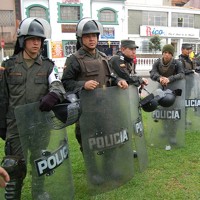Colombian security forces are in demand internationally, with the United Arab Emirates seeking to hire 3,000 Colombian soldiers and Mexico and Honduras turning to Colombian security officials for advice on fighting crime. In an email interview, Elyssa Pachico, a researcher, writer and senior editor for InSight Crime, discussed Colombia’s status as a security exporter.
WPR: How has the international profile of Colombia's security forces changed over the past decade or so?
Elyssa Pachico: In the 1990s, Colombia’s security forces were seen at best as unprofessional and at worst as totally corrupt. Right up until the implementation in 2000 of Plan Colombia, the multibillion dollar U.S. aid package for Colombia to fight drug trafficking, there was well-founded concern that government security forces were out-equipped by the guerrillas and the drug cartels. The FARC guerrillas handed the military one embarrassing defeat after another. The police had no credibility. The military worked openly with paramilitary forces, showing little respect for human rights. So from around the time that President Alvaro Uribe took office in 2002, Colombia has gone from having an underfunded police and a military that was not very effective to having a professionalized force that is seen as a model not just for Latin America, but for any country struggling with the nexus between drug trafficking, organized crime and terrorism.

